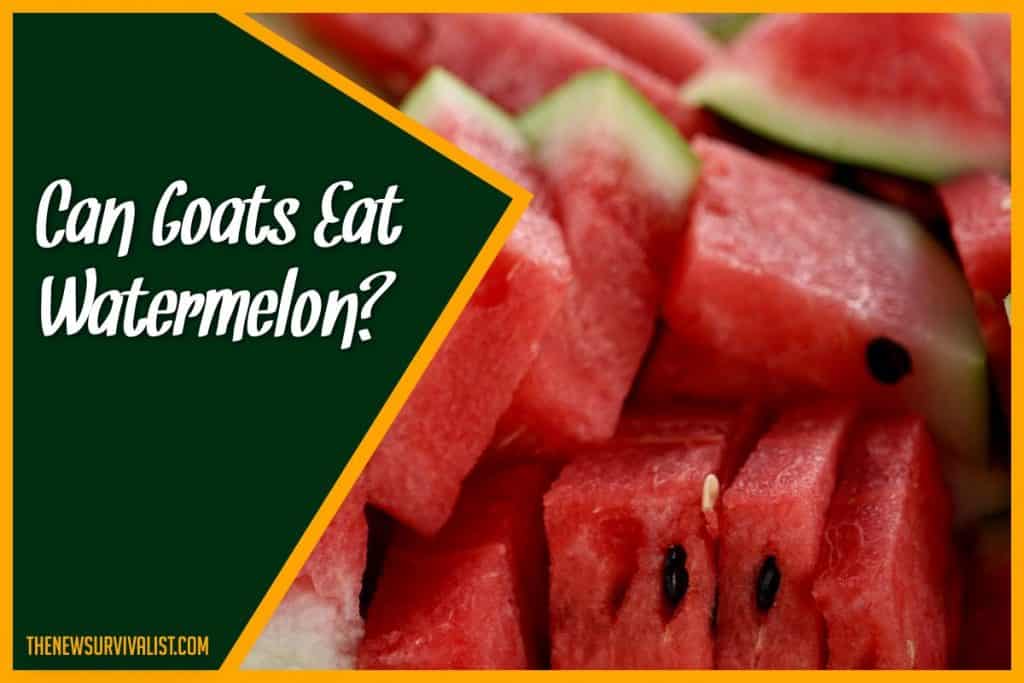Goats are ruminants, which means that they have four stomach compartments, allowing them to digest a wider variety of foods than other animals. As a result, goats have developed a reputation for being able to “eat anything”; however, this is a misconception. On the contrary, goats are picky eaters who only go after the most nutritious options. One such healthy option is the watermelon.
Can goats eat watermelon? Goats can eat watermelon, including the rind, and it can be given as a healthy treat. The fruit can provide goats with energy, minerals, and vitamins, including vitamins A, C, and K. However, even though watermelons are beneficial to goats as treats, they can be detrimental to their health in excess and should not be the staple diet.
This article will discuss why both watermelon fruit and watermelon rind are safe for goats to eat, as well as explain how these parts of the watermelon can provide valuable nutrition for goats. Also discussed is how best to integrate watermelon into your goats’ diet, as well as how to safely prepare the fruit before feeding.
Can Goats Eat Watermelon Fruit?
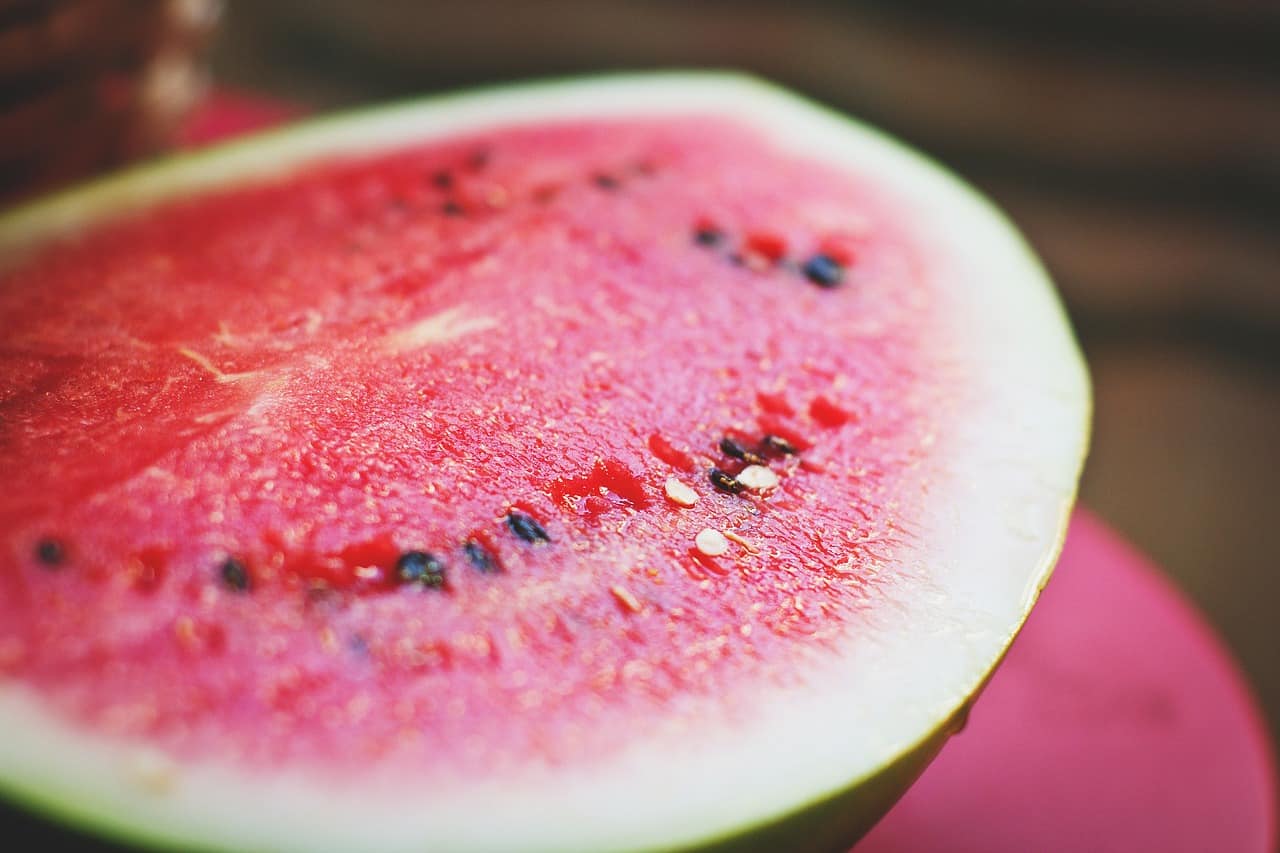
Goats are ruminants, which means that they “chew the cud” (chew and regurgitate their food more than once), and their digestion occurs sequentially in four stomach chambers. In the first of these chambers, called the rumen, the food is fermented to break it down.
This highly efficient digestive system allows ruminants to absorb nutrition from foods that humans cannot eat. Chief among these is cellulose, which comprises most of a goat’s diet through grass and legumes. In contrast, humans cannot digest cellulose because we lack the enzymes to break it down. Goats (and other ruminants) cannot produce these either; instead, the microbes in their rumens produce them.
Unlike the tough cellulose that goats are used to eating, soft watermelon fruit (which humans can eat) is much easier to digest. So yes, goats can eat watermelon. In fact, watermelon fruit is 90-91% water, which makes it highly digestible. The fruit is also composed of 8% carbohydrates, 0.6% protein, and 0.2% fiber.
The carbohydrates present are mainly sugars (fructose, glucose, and sucrose), which are readily digestible by goats. The fermentative bacteria in the goat’s rumen allow them to digest protein. Lastly, digesting fiber (such as cellulose) is precisely what ruminants like goats are designed to do, so it is not a problem.
Can Goats Eat Watermelon Rind?
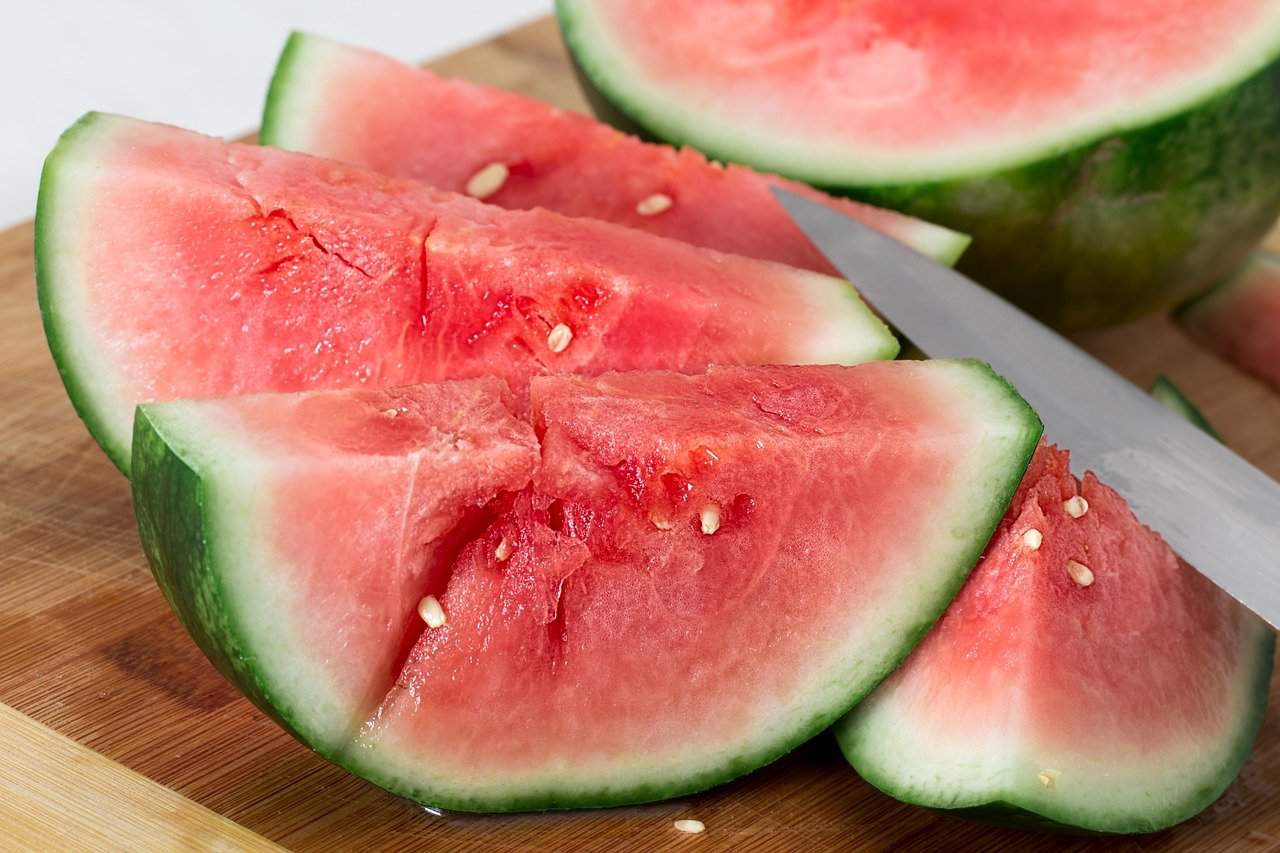
Watermelon rind has most of the same components as the fruit, except in different proportions. By dry weight (excluding water content), the rind is mostly carbohydrates (64.48%), followed by fiber (18.54%) and protein (6.92%). In addition to these components being fully digestible by goats, they are also highly nutritious.
Are Watermelons Healthy for Goats?
Goats need 2-3 gallons of water daily. Because watermelon fruit is mostly water, feeding it to goats helps keep them sufficiently hydrated, and this is especially important when the weather is hot. The moisture content of watermelon fruit also makes it particularly useful to goat farmers in deserts and other arid areas.
The carbohydrate and protein content of watermelon fruit and rind is also healthy for goats. Carbohydrates are the primary source of a goat’s energy, but this usually needs to be extracted from cellulose, which can take a long time. Goats fed mostly roughage (high-cellulose food like hay and pasture) typically take 11-15 hours to digest their food.
In contrast, the sugars in watermelon fruit and rind can provide a more readily available energy source. Extra energy can be useful to nursing does or in bad weather when the goats are more stressed.
On the other hand, goats need the protein in watermelon fruit and rind to build their bodies. This makes protein intake especially important for growing goats. The proteins are digested and broken down into amino acids, which then serve as building blocks for muscles.
In addition to water, carbohydrates, and protein, watermelon fruit and rind are also rich in vitamins and minerals. These support healthy body functions.
A goat’s diet must contain the vitamins A, D, E, and K, as their bodies cannot synthesize these. Fortunately, watermelon fruit is an excellent source of these fat-soluble vitamins: each 100g of fruit contains 0.610 mg of vitamin A, 8.3 mg of vitamin C, 0.04 mg vitamin E, and 0.07 mg of vitamin B6.
Goats need several types of minerals, which they need to take in through their diets. These include phosphorus, potassium, iron, and manganese, four of the 15 essential minerals for goats. Watermelon is a rich source of these four: each 100g of fruit contains 112 mg of potassium, 10.97 mg of phosphorus, 0.188 mg iron, and 0.039 mg of manganese.
Like the fruit, watermelon rind is also healthy for goats; although it contains less water, it has higher proportions of essential nutrients. In addition to the higher percentages of carbohydrates, fiber, and protein, the rind also contains more vitamins and minerals.
Per 100g of dried fruit, watermelon rind contains 447.33 mg of potassium, 0.611 mg of iron, and 0.240 mg of manganese. Because of this, the rind is actually healthier for goats than the fruit.
How Often Can You Feed Watermelon to Goats?
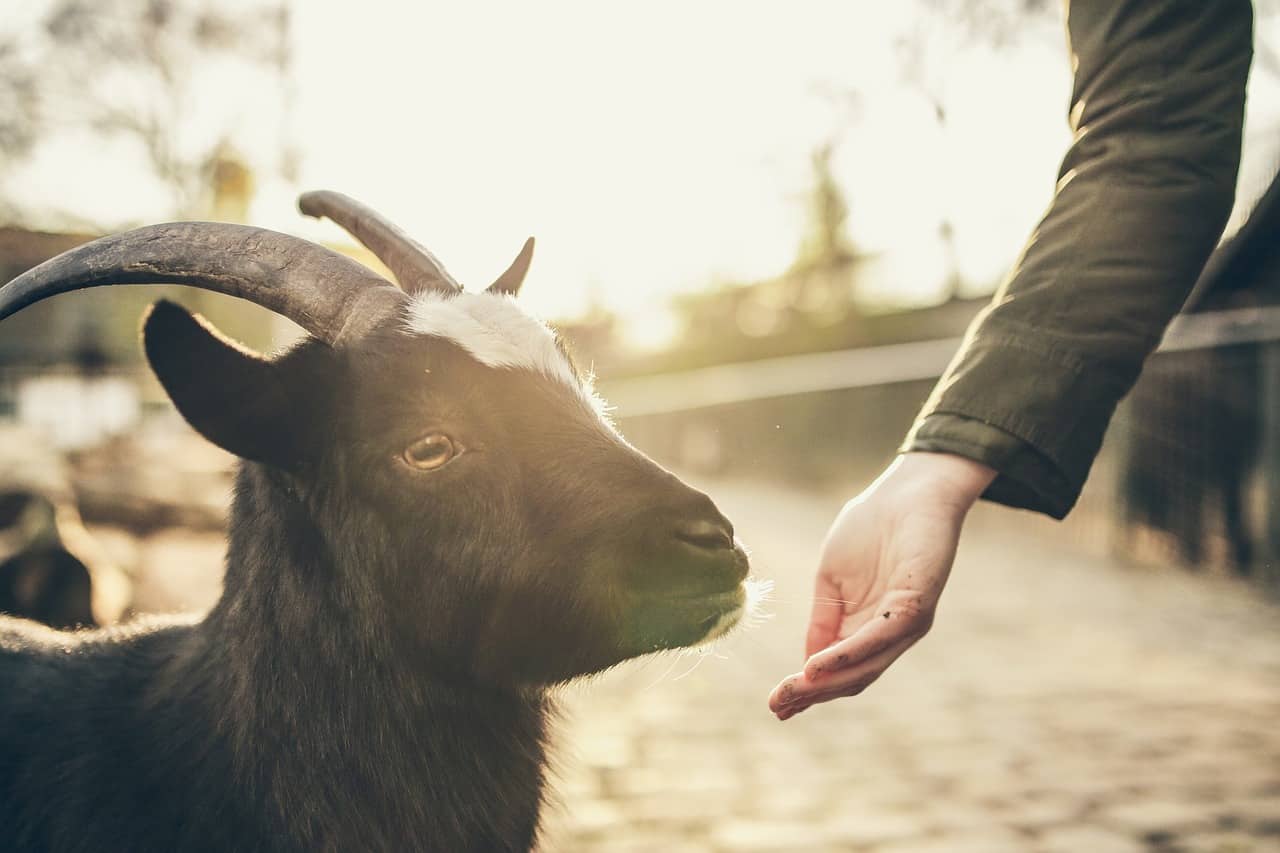
Goats can subsist entirely on good-quality roughage such as legumes and alfalfa, which should constitute most of their diet. In fact, feeding too many high-energy foods like grains and fruits can lead to illnesses like ruminal tympany (“goat bloat”).
The rind is the part of the watermelon that is healthiest for goats; however, they prefer juicy flesh. Watermelon fruit is highly palatable to goats, and they will choose it over the roughage that should constitute most of this diet. For this reason, watermelon fruit should only be given as treats and after the goats’ daily meal.
Even though it is nutritious, watermelon fruit should only be fed in limited quantities and constitute only up to 10% of the goat’s diet. Watermelon fruit is high in sugar, which encourages excessive weight gain and accelerates the fermentation in the rumen. Accelerated fermentation can produce excess gas, leading to goat bloat.
Goat bloat can cause restlessness, abdominal discomfort, loss of appetite, and increased salivation. This can harm your animal, so it is best to feed watermelon only in moderation.
How to Prepare Watermelons for Goats to Eat
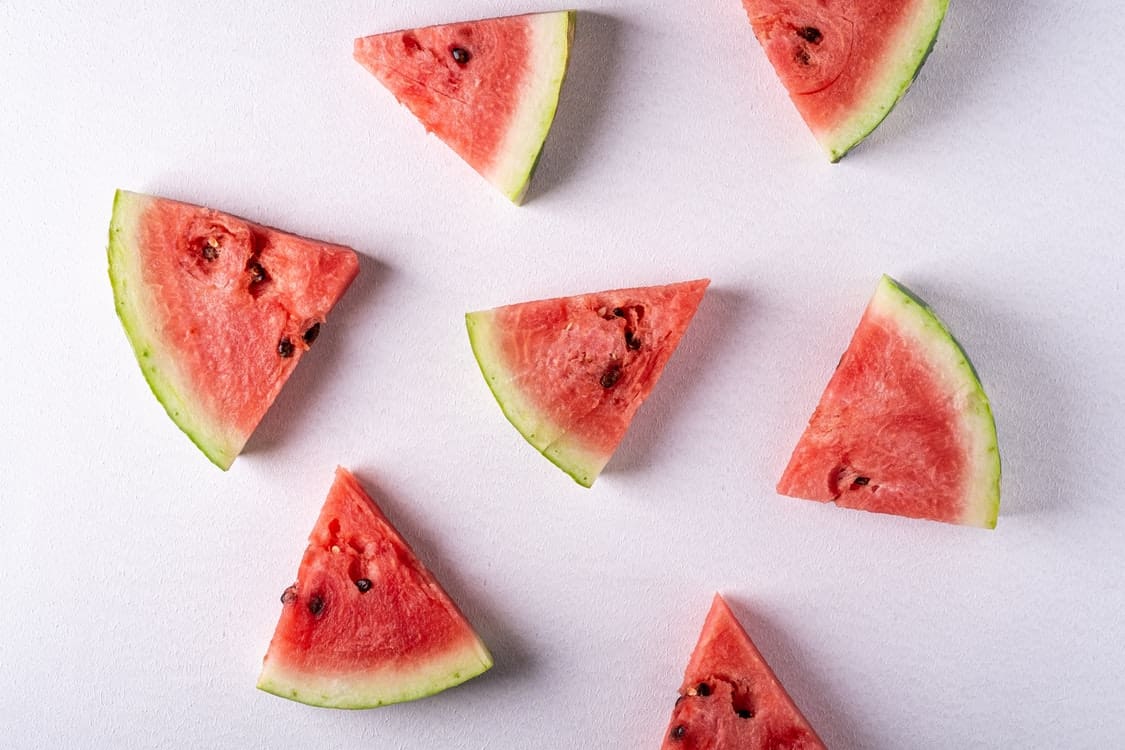
Before feeding any part of a watermelon to a goat, always wash it thoroughly. This removes any pesticides that may have been used on the fruit when it was being grown. Not only can ingesting pesticide upset a goat’s stomach, but it can also affect its nervous system to potentially cause death.
Once washed, the watermelon (both the fruit and the rind) should be chopped into goat-bite-sized pieces so that they can chew these easily and not choke. This step is important for any food you intend to feed to goats, such as watermelons and carrots, as it is difficult for them to open their mouths wide enough to fit large chunks of food. To help ensure that the right amount of watermelon is being fed, give only two to three slices with hay.
Can Baby Goats Eat Watermelon?
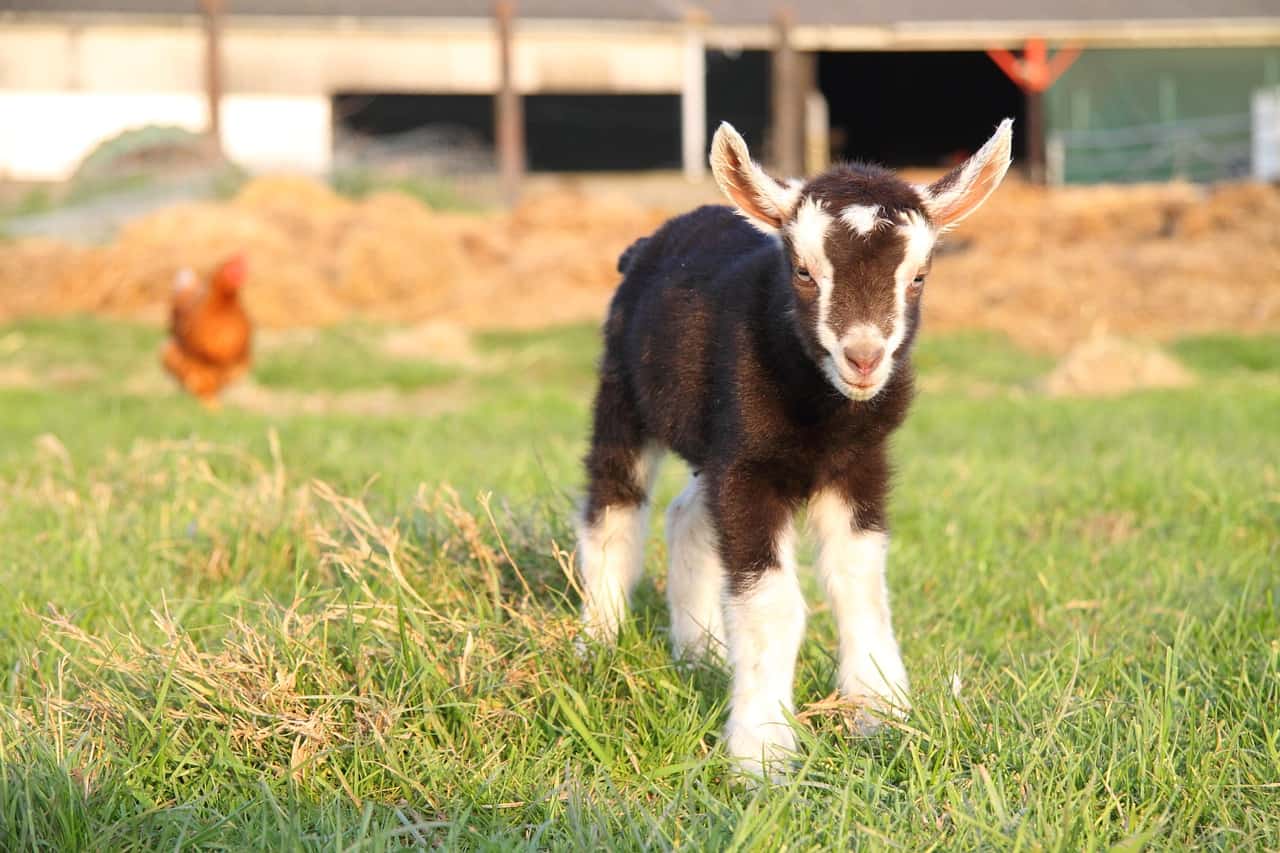
Baby goats should be fed almost entirely on their mother’s milk (or milk replacement, if this is not available) for the first few weeks of their lives. The first milk that the mother doe produces is called colostrum, and it is high in nutrients and immune-building antibodies.
Doe’s milk is also tailored to the needs of baby goats. Feeding watermelon at this stage, since the fruit is so palatable, could cause the baby goat to eat more watermelon and drink less doe’s milk. This is detrimental to the growth of the baby goat.
Watermelon can be fed to baby goats once they have been weaned. Baby goats are generally weaned at 60 to 90 days of age; however, it is better to watch for specific signs. It is time to wean a baby goat when it is 2 to 2.5 times its birth weight and eats solid food consistently.
New foods, such as watermelons should also not be introduced to baby goats before their digestive systems are sufficiently developed. This involves making sure that the microbes in the rumen are populous enough to help the baby goat digest its food. One way to jump-start the development of a goat’s rumen is to offer small amounts of grain after the first week of life.
The digestive system of a goat is also highly sensitive and can be upset by any sudden changes in diet. When introducing watermelon to the diet of a baby goat, start by giving small pieces along with hay.
Final Thoughts
Goats are ruminants with highly specialized digestive systems that allow them to digest foods that humans cannot, like cellulose. Watermelon is easy for goats to digest; furthermore, it contains many nutrients essential to goats, such as carbohydrates, fiber, protein, and vitamins and minerals. In addition to the fruit, the rind of the watermelon is also edible for goats; while it may not be as palatable, it is more nutritious.
However, it is essential to note that feeding watermelon to goats is only beneficial when in moderation. When watermelon exceeds 10% of a goat’s diet, it can lead to health issues such as bloat. Despite its nutritional benefits, watermelon is also not a substitute for doe’s milk and should only be introduced to the diet of a baby goat once it is weaned.

